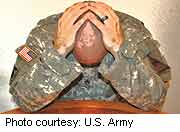
TUESDAY, May 3 (HealthDay News) — Military personnel who have a psychiatric disorder prior to deployment or who’ve been injured during combat are more likely to develop post-traumatic stress disorder (PTSD) after they return home.
The PTSD tends to be worse with more serious injuries, according to a study in the May issue of the Archives of General Psychiatry.
The findings may help identify people who are more vulnerable to the disorder, the researchers noted.
“The more you know about a person, the better off you’ll be to address their needs” through interventions and treatments, added Robert Bossarte, assistant professor of psychiatry at the University of Rochester Medical Center, who was not involved with the study.
For this study, researchers had data on the mental health of nearly 23,000 servicemen and women prior to their deployment to Iraq or Afghanistan.
Before they were deployed, 739 — or 3.3 percent — had at least one psychiatric disorder, including PTSD, depression, panic syndrome or another anxiety syndrome. About 0.8 percent were injured while deployed.
After deployment, a follow-up questionnaire found that about 8 percent had symptoms of PTSD.
The study found that men and women who had one or more mental health disorders prior to deployment were 2.5 times more likely to develop post-deployment PTSD.
Those who had symptoms of PTSD before deployment had almost five times the chance of having PTSD afterward.
Those with more severe injuries were also more likely to have PTSD, although prior mental health was more strongly associated with later PTSD, researchers said.
Researchers also found that PTSD tended to develop more than six months after the injury, indicating that military personnel should be monitored for signs of the disorder over the long-term, not just immediately after the incident.
The findings suggest that pre-deployment mental health questionnaires could identify those who are either at risk of development PTSD or most likely to be resistant to it, said study co-author Cynthia A. LeardMann, a senior biostatistician with the Henry M. Jackson Foundation at the Naval Health Research Center in San Diego.
One strength of this study is that researchers had information about participants’ pre-deployment mental health, said Keith Young, vice chair for research of psychiatry and behavioral science at Texas A&M Health Science Center College of Medicine.
Although women in this study had a 27.6 percent higher chance of developing PTSD after an injury than men, Young said that’s not much of a difference.
“There had been an idea that women were tremendously more likely to get PTSD but we have had data including this paper that’s showing that’s really not true,” said Young, who is also core leader for neuroimaging and genetics at the Center of Excellence for Research on Returning War Veterans in Temple.
More information
The U.S. Department of Veterans Affairs has more on PTSD.

